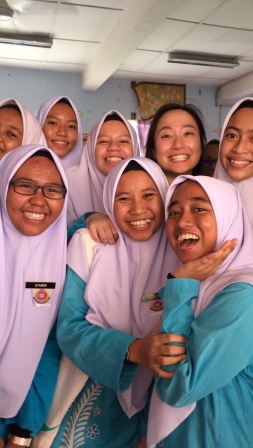I didn’t plan to make my first blog post political at all. But all the hours of training spent on cross-cultural awareness, identity, and public diplomacy from the past 2 weeks didn’t prepare me for my first interaction with Malaysian students nor did it ease this lingering anxiety that I’m not quite American enough. Yesterday, ETAs (38 of us) on the east coast of Malaysia (predominantly Malay Muslim) visited a secondary school in Kuala Terengganu, Terengganu as part of our regional orientation.

I peeked inside a Form 4 class (16 year olds) that had around 20 girls eager to meet us, the Americans. As I said my “hellos” a group surrounded me and began to ask questions. However, I wasn’t expecting my first question to be “Teacher, I know this is a sensitive question but what do you think about Trump? Do you like Trump?” I knew these questions were coming but not this soon. I couldn’t maintain my smile and simply stated “I didn’t vote for him.” The girls immediately began to cheer and clap, but quickly moved onto more important questions like if I’ve met Justin Bieber. Rarely do teenagers, in my experience, talk about politics but also make it a priority, a conversation starter. What does this mean about how America is perceived today? Sure, this 5 minute Q&A doesn’t define America’s global image but it does shed light to the underlying uncertainty and uneasiness, Trump’s presidency brings. These young girls who would rather talk about Ariana Grande and Taylor Swift were, I think, compelled to ask about Trump because as Muslims they are worried and scared by his rhetoric, actions, and future. They wanted reassurance, maybe even needed to hear from a real live American that what he says and tweets doesn’t truly represent America. But more importantly their qualms about Trump also helped me reflect about my deepest fears about a Trump America.
Even before starting this program, I knew that as an Asian-American representing the US as a Fulbright ETA I was going to be given a different set of problems. Even during the interview process I was asked, “How will you react and respond to locals when they question your identity or legitimacy as an American since you don’t fit their stereotypical image of an American.” I remember answering, “This is why it’s more important that I become an ETA, to show them that Americans are diverse and more than just the blond hair, blue-eyed John Smiths. My physical appearance doesn’t make me any less American than anyone else.” I told them I was ready for that push back, the skepticism. Yet, imagining meeting my mentor (the teacher in charge of the ETA) for the first time or my new community and seeing them disappointed to meet me because I am not the white American they anticipated slowly ate away my excitement for this new endeavor. Even at orientation in Kuala Lumpur (KL) we talked about navigating one’s identity and how people of color may receive some negative reactions or need to do more explaining about how and why they are American. Essentially prove to the Malaysians that they (and I) are Americans. I knew it was coming, but it still kept me up at night. Sight-seeing around KL in a group, locals would ask where we were from and someone in the group would say the United Sates, but the locals would do a double take with me. The compulsory back and forth is when they ask, “Where are you from?” and I say, “Texas,” but they continue to ask until I have to say, “I was born in Dallas, Texas, but my parents are from Korea.” The mystery is solved and they’re no longer curious nor do they care about me. Even visiting the school yesterday, I was honestly anxious that the students weren’t going to be excited to see me or want to talk to me. Thankfully Kpop saved me and they were screaming the names of their favorite girl groups and boy bands. I felt like the popular kid in school I never was. But I wonder if it would be different if I was Chinese (which I was asked a lot) or another Asian ethnicity. Why should my Korean identity make me cool? Does this mean I’m still cool as an American? I was confused, still am confused, and don’t know how I feel about that.
But the unfortunate reality is I’ve been asked these same questions, with the same connotations and vocals inflections my whole life in America, by Americans. Where are you from = No, where are you really from? I constantly need to prove my American identity even in my own country. I have to justify my US citizenship by stating my place of birth. I thought I’ve grown numb to the rude inquiries and suspicions both back at home and abroad, but this new president and my new position as an unofficial ambassador (that is paid less, but has more fun) brings back painful memories and new anxieties. What does Trump mean for Americans like me? For other non-white Americans? I share the same concerns as the Malay Muslim students I’ve met yesterday. Is there a place for us (non-white Americans, immigrants, or foreigners), in Trump’s America? Who is an American?
I’ll share one last story. When we (the ETAs) finally met our mentors, one of the mentors who has a white female ETA this year said, “Oh, finally we have a pure American.” The school’s previous ETAs were black and Asian. Maybe there is such a thing as a pure American, she should ask Trump.